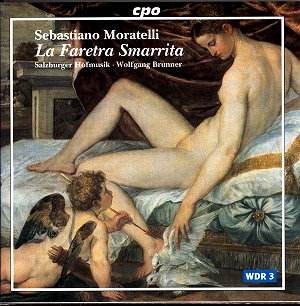This is a novelty.
Little is known about the Italian musician Sebastiano
Moratelli.
He was born in Vicenza in 1640 and went to Austria
in the late 1650s and was employed in the Court of Arch-duchess Anna
Maria Josepha. On her marriage to the prince elector, Johann Wilhelm,
Moratelli became a member of the Court in Dusseldorf eventually becoming
Music Director. He retired to Heidelberg and died there in 1706. He
wrote operas and serenades (serenatas) often to libretti by Johann Wilhelm's
secretary Giorgio Maria Rapporini. It was thought that all of his music
was lost until the score of La Faretra Smarrita was discovered
in the library of the Counts of Toerring-Jettenbach.
A serenata is a cross between a cantata and
an opera. The plot is trivial.
Mercurio, the messenger of the gods, has lost his golden
quiver with its golden arrows of graces (one is actually called grace
and there are others called majesty, beauty and innocence).
He tells the god Amor who demands to known how this happened. Mercurio
says that he laid the quiver down by a stream in order to 'have sport'
with the beautiful nymphs and it was stolen. Amor and Mercurio travel
throughout the world to try to find this quiver and, as the characters
suggest, they visit Africa and America and then Europe. Here, when Amor
asks about the quiver, there is an echo mentioning the names of Anna
and Arno. Amor comes to the conclusion that a beautiful woman stole
the quiver which has made the thief the personification of love and
therefore worthy of universal praise.
Totally absurd.
This serenata was composed around 1690 and consists
of a brief prelude and 28 short arias and recitatives.
The work is contemporary with fellow Italians, Corelli
and Alessandro Scarlatti and with that great French composer, Rameau.
In England his contemporaries would be John Blow and Purcell. And yet
to my ears his music is so different, Let me quote two main reasons:
namely the absence of fussy ornamentation and the use of a trombone!
While the precursor of the trombone, the sackbut, was known in the sixteenth
century the trombone, as such, was not familiar until the end of the
eighteenth century. Its appearance in this serenata is therefore
strange but somewhat effective.
The music is very polished and, as far as I can judge,
very well performed. There is some excellent singing although I have
to say that the work is not stunning! But there is an airy, out of doors
feel which is welcome. On the other hand this piece is far more attractive
than some secular vocal works by Handel, for example.
I must confess that this work has a strange charm.
I wonder if any more of Moratelli's work will be discovered.
For lovers of early music this is well worth investigating.
The accompanying booklet is a handsome production.
David Wright


